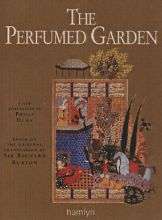The Perfumed Garden
The Perfumed Garden of Sensual Delight (Arabic: الروض العاطر في نزهة الخاطر Al-rawḍ al-ʿāṭir fī nuzhaẗ al-ḫāṭir) by Muḥammad ibn Muḥammad al-Nafzawi is a fifteenth-century Arabic sex manual and work of erotic literature.
The book presents opinions on what qualities men and women should have to be attractive, gives advice on sexual technique, warnings about sexual health, and recipes to remedy sexual maladies. It gives lists of names for the penis and vagina, has a section on the interpretation of dreams, and briefly describes sex among animals. Interspersed with these there are a number of stories which are intended to give context and amusement.

History
According to the introduction of Colville's English translation, Muḥammad ibn Muḥammad al-Nafzawi probably wrote The Perfumed Garden sometime during the twelfth century. Sheikh Nefzawi, full name Abu Abdullah Muhammad ben Umar Nafzawi,[1] was born among the Berber Nefzawa tribe in the south of present-day Tunisia. He compiled at the request of the Hafsid ruler of Tunis, Abū Fāris ʿAbd al-ʿAzīz al-Mutawakkil, the present work. The reputation acquired by this work in the Arab world was similar to that of the Arabian Nights.
Translations
1886: Burton English translation
The Perfumed Garden first became widely known in the English speaking world through a translation from the French in 1886 by Sir Richard Francis Burton. Burton mentions that he considers that the work can be compared to those of Aretin and Rabelais, and the French book Conjugal Love by Nicolas Venette. But what he believes makes The Perfumed Garden unique in the genre is "the seriousness with which the most lascivious and obscene matters are presented." Burton points out that not all of the ideas in The Perfumed Garden are original: "For instance, all the record of Moçama and of Chedja is taken from the work of Mohammed ben Djerir el Taberi; the description of the different positions for coition, as well as the movements applicable to them, are borrowed from Indian works; finally, the book Birds and Flowers by Azeddine el Mocadecci (Izz al-Din al-Mosadeqi) seems to have been consulted with respect to the interpretation of dreams."
The French manuscript that Burton translated from was one printed by Isidore Liseux in 1886. This manuscript's last chapter — Chapter 21 — was incomplete, apparently because it contained material on homosexuality and pederasty which had been removed. When Burton died in late 1890, he was working on a new translation of the original manuscript, including this missing chapter. The revised translation, due to be retitled The Scented Garden, was never published as Burton's wife Isabel burned the manuscript soon after his death.
1976: Khawam French translation
A new French translation by René R. Khawam was published in 1976.
1999: Colville English translation
In 1999, Jim Colville published the first English Perfumed Garden translated directly from the Arabic original. Of the Burton translation, he says, "details were expanded, episodes introduced and whole sections incorporated from other, non-Arabic, sources. The text is dressed up in a florid prose alien to the style of the original and many of the notes are sheer speculation. The result is a consistently exaggerated and bizarre misrepresentation of the original".
Exaggeration on the part of Burton is vividly illustrated in Chapter 6, titled "Sexual Technique" in Colville's translation and "Concerning Everything That Is Favourable to the Act of Coition" in Burton's. Burton's translation is perhaps 25 pages long, lists 39 sex positions as well as 6 types of sexual movement, and gives creative names to many of these. Colville's translation is 2½ pages long, and lists 11 unnamed sex positions.
Inspiration for musical works
In 1923 the English composer Kaikhosru Shapurji Sorabji wrote Le jardin parfumé: Poem for Piano Solo.[2]
Omnium Gatherum, a Finnish melodic death metal band, also wrote a song called "The Perfumed Garden", released on their "Spirits and August Light" album in 2003.
Ray Manzarek, inspired by this, recorded a track called Perfumed Garden for his solo album The Whole Thing Started With Rock & Roll, Now It's Out Of Control.
See also
Footnotes
- ↑ أبو عبدالله محمد ابن عمر النفزاوي
- ↑ http://www.mus.ulaval.ca/roberge/srs/04-sourc.htm
References
| Wikisource has original text related to this article: |
- The Perfumed Garden of Sensual Delight, Muhammad ibn Muhammad al-Nafzawi, translated by Jim Colville, 1999, Kegan Paul International, ISBN 0-7103-0644-X, 82 pages.
- La prairie parfumée ou s'ébattent les plaisirs, Umar Ibn Muhammad Nafzawi [sic], translated by René R. Khawam, 1976, ISBN 2-85940-005-2.
- The Perfumed Garden, Shaykh Nefwazi [sic], translated by Sir Richard Francis Burton, Benares, 1886. Many reprintings including:
- ISBN 0-586-01643-0
- ISBN 1-85326-600-0
- Full text online